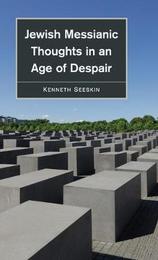
|
Jewish Messianic Thoughts in an Age of Despair
Hardback
Main Details
| Title |
Jewish Messianic Thoughts in an Age of Despair
|
| Authors and Contributors |
By (author) Kenneth Seeskin
|
| Physical Properties |
| Format:Hardback | | Pages:232 | | Dimensions(mm): Height 221,Width 145 |
|
| Category/Genre | Judaism
Judaism - theology |
|---|
| ISBN/Barcode |
9781107017924
|
| Classifications | Dewey:296.336 |
|---|
| Audience | | Professional & Vocational | |
|---|
|
Publishing Details |
| Publisher |
Cambridge University Press
|
| Imprint |
Cambridge University Press
|
| Publication Date |
6 February 2012 |
| Publication Country |
United Kingdom
|
Description
Belief in the coming of a Messiah poses a genuine dilemma. From a Jewish perspective, the historical record is overwhelmingly against it. If, despite all the tragedies that have befallen the Jewish people, no legitimate Messiah has come forward, has the belief not been shown to be groundless? Yet for all the problems associated with messianism, the historical record also shows it is an idea with enormous staying power. The prayer book mentions it on page after page. The great Jewish philosophers all wrote about it. Secular thinkers in the twentieth century returned to it and reformulated it. And victims of the Holocaust invoked it in the last few minutes of their life. This book examines the staying power of messianism and formulates it in a way that retains its redemptive force without succumbing to mythology.
Author Biography
Kenneth Seeskin received his BA from Northwestern University in 1968 and his Ph.D. from Yale University in 1972. He joined the faculty of Northwestern in 1972 and has taught there ever since. He is the author of seven books and numerous articles, editor of The Cambridge Companion to Maimonides and co-editor of The Cambridge Guide to Jewish History, Culture, and Religion. In 2001, he won the Koret Jewish Book Award for Searching for a Distant God and, in 2011, the National Jewish Book Award for The Cambridge Guide to Jewish History, Culture, and Religion. In 2009, Seeskin was named Philip M. and Ethel Klutznick Professor of Jewish Civilization.
|